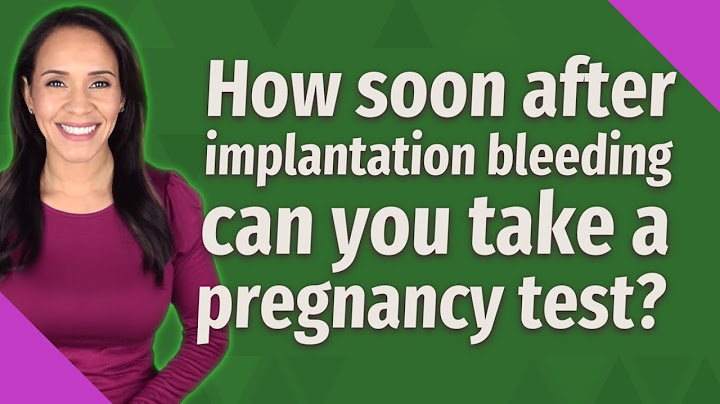If you're pregnant, you're likely paying extra close attention to your body. If you feel a cramp, you may worry that it is a sign of a miscarriage, especially if it is early in your pregnancy. Show
While the first trimester is the most common time for miscarriages, there are other reasons for cramps. Whether cramping signals a miscarriage depends on when it occurs, severity, and whether you're experiencing other symptoms with it. Cramping in Early PregnancyHaving cramps in your lower abdominal area or lower back in early pregnancy (the first trimester) most likely signals one of three things:
Symptoms of MiscarriageLook out for these signs and symptoms of miscarriage in the first trimester.
Contact your doctor if you notice any of these symptoms. Miscarriage is the most common cause of early bleeding in pregnancy. However, it's important to note that early bleeding could actually be a threatened miscarriage. This is diagnosed when there's uterine bleeding but the cervix is closed and an ultrasound shows that the baby's heart is beating. Fortunately, threatened miscarriages don't always result in pregnancy loss, even when there's a lot of blood on more than one occasion. If you experience spotting or bleeding that's concerning, your doctor may perform an ultrasound to check on the baby's status. Cramping in Late PregnancyCramping in the second or third trimester could be harmless or concerning—it depends on the situation.
A Word From VerywellA little bit of anxiety is totally normal in early pregnancy. After all, your life is about to change with the addition of this tiny bundle of joy. Your instinct is to protect your little one and make sure that he or she is as healthy and as safe as possible. Talk to your doctor whenever you are concerned about any level of cramping during pregnancy. It can be a stressful time, and talking to your doctor about your symptoms can be very reassuring. By Krissi Danielsson Thanks for your feedback! A blood test may be done to measure human chorionic gonadotropin (hCG, pregnancy hormone). This substance is made by your body during pregnancy. You may have more than one test because hCG levels increase throughout pregnancy. Your blood type also will be checked to see if you need treatment for Rh sensitization (RhoGAM). Ultrasound may be used to find the cause of the bleeding. Sometimes the cause is not found. Spotting may occur after a vaginal ultrasound or a pelvic exam. Bleeding of the cervix may also occur during sex, or from an infection of the cervix. If you experience bleeding, do not have sex again until consultation with the doctor. You may also want to decrease heavy physical activity and exercise, although most women can continue work and their usual day-to-day activities. Keeping a record of spotting, bleeding, cramping, and other symptoms can be helpful for your doctor. Miscarriage can be caused by a problem with the pregnancy. Bleeding does not always mean that miscarriage will happen. The following signs and symptoms may indicate a miscarriage: (1) Vaginal bleeding, (2) Cramping pain felt low in the abdomen–often more strong than menstrual cramps, (3) Tissue passing from the vagina. Miscarriage can occur any time in the first half of pregnancy. Most often it occurs in the first 13 weeks. It happens in about 15–20% of pregnancies. Many women who have vaginal bleeding have little or no cramping. Sometimes the bleeding stops and pregnancy goes on. Other times the bleeding and cramping may become stronger, leading to miscarriage. If you think you have passed fetal tissue, take it to the doctor’s office. The doctor may send it to a lab to be examined. If some tissue stays in the uterus, bleeding often continues. Your doctor may then recommend one or more treatment options. Medication may be used to help you pass the tissue. The tissue may be removed by dilation and curettage (D&C). It also may be removed by a suctioning device. This is called suction curettage. Sometimes more than one option is needed. Most miscarriages cannot be prevented. They are often the body’s way of dealing with a pregnancy that was not normal. There is no proof that exercise or sex causes them. Also, there is no proof that stress or work causes them. Having a miscarriage does not mean you cannot have more children. Less than 5% of women will experience two consecutive miscarriages, and only 1% experience three or more. It does not always mean something is wrong with your health. If you have two in a row, your doctor may suggest tests to look for a cause. An ectopic pregnancy occurs when the fertilized egg does not implant in the uterus. Instead, it implants somewhere else, often in one of the fallopian tubes. An ectopic pregnancy causes pain and bleeding early in pregnancy. A major risk with this type of pregnancy occurs if the fallopian tube ruptures. A rupture needs prompt treatment. There may be internal bleeding. Blood loss may cause weakness, fainting, pain, shock, or death. Ectopic pregnancies are much less common than miscarriages. They occur in about 1 in 60 pregnancies. Women are at a higher risk if they have had: an infection in the fallopian tubes (such as pelvic inflammatory disease), a previous ectopic pregnancy, or tubal surgery. Some information above provided by the American College of Obstetricians & Gynecologists How much bleeding is normal for early pregnancy?Implantation bleeding
“It happens between 6 and 12 days after conception as the fertilized egg implants into your uterus,” Dr. Heber says. This bleeding is typically light and may last for a few days.
How long does spotting and cramping last in early pregnancy?Only about a third of pregnant women experience implantation bleeding after they get pregnant, but it's considered a normal symptom of pregnancy. In most cases, implantation spotting only lasts from a few hours to a couple days, but some women report having implantation spotting for up to seven days.
Does light bleeding and cramps mean miscarriage?Vaginal bleeding is the most common symptom of miscarriage. This varies from light spotting or brown discharge, to a heavy bleed that may be heavier than a normal period. Light bleeding before 12 weeks (during your first trimester) of pregnancy can be quite common and is not always a sign of miscarriage.
Can you have cramps and bleeding without miscarriage?Cramping. As with spotting, cramping can occur in normal pregnancies and are not in and of themselves a sign of a problem. Certainly, in the early stages of pregnancy, cramping may develop as the placenta implants the uterus although it is usually mild and short-lived.
|

Related Posts
Advertising
LATEST NEWS
Advertising
Populer
Advertising
About

Copyright © 2024 mempelajari Inc.


















